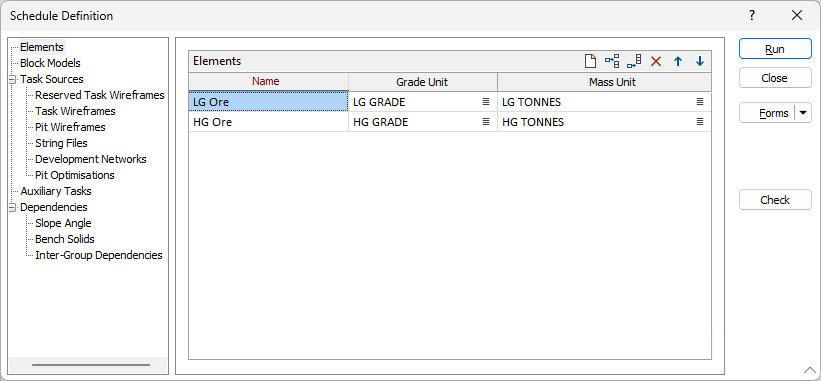Elements
On the Elements tab of the Schedule Definition form, setup the elements that will be mapped to the Element fields defined in each block model.
Note that the term Element is used for any final product of the mining operation. While in many cases this is an atomic element like gold, copper, or iron; in this context it can refer to more complex products like alumina or coal.
Elements are recovered from material bins by processing facilities, after which they can be sold to customers. Elements should be defined for any of the following purposes:
- Specifying the outputs from processing facilities.
- Specifying and reporting the grades of stockpiles.
- Producing breakdowns of volumes, masses, grades and revenues by element in Optimisation Results and Extractions reports.
Name
Setup the elements that will be mapped to the element fields defined on the Elements tab of the Reference Block Model form. Use the buttons on the local toolbar to Manage the rows in the list.
For each element, a scheduler attribute is created based on the element name (if it does not already exist).
Grade Unit
For each element, select the Grade Unit. The Units you can select are defined for the schedule on the Scheduling | Schedule tab, in the Attributes group.
Mass Unit
For each element, select the Mass Unit. The Units you can select are defined for the schedule on the Scheduling | Schedule tab, in the Attributes group.
Auto Generate Attributes
Click this button to auto-generate attributes whenever an attribute re-build is required. Individual task-types can then be edited to turn off any attributes that aren’t needed.

A schedule attribute is auto-generated for every wireframe attribute defined by every task source.
Each task source defines a set of wireframe attributes which can be used as variables in task attribute expressions. These include reserving fields defined by the task source’s nominated reference block model, such as mass, density, and element grades and masses. Some tasks sources also define their own specific wireframe attributes. For example, the Pit Wireframes task source can define BENCH NAME, BLOCK_INDEX, and BENCH_Z.
Auto-generated attributes have names based on the task source wireframe name, with underscores being replaced by pipe characters. For example, “Gold_Grade” becomes “Gold | Grade”.
Generate task type expressions
When this check box is selected, task type attribute expression configuration is performed after attribute auto-generation, either via the Auto Generate Attributes button or via the Re-generate on Run setting (see below).
For each task type used by each task source, each auto-generated schedule attribute is assigned to take the value of the wireframe attribute it was generated from. For example, an auto-generated attribute “Gold | Grade” is assigned the expression “{Gold_Grade}”.
In addition to setting up expressions for auto-generated attributes, some of the default attributes built into every task type are assigned appropriate expressions where possible. These are:
| Schedule Attribute | Expression |
|---|---|
| Bench | {Bench_Name} |
| Index | {Block_Index} |
| Level | {Bench_Z} |
Re-generate on Run
This option is off by default. If this check box is selected, task attributes will be auto-generated when the schedule definition is run.
